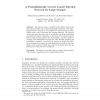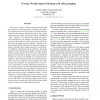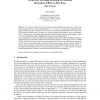72 search results - page 2 / 15 » Increasing Subsequences and the Classical Groups |
COLCOM
2005
IEEE
14 years 1 months ago
2005
IEEE
Using a combination of machine learning probabilistic tools, we have shown that some chemistry students fail to develop productive problem solving strategies through practice alon...
WDAG
2000
Springer
13 years 11 months ago
2000
Springer
This paper presents a scalable leader election protocol for large process groups with a weak membership requirement. The underlying network is assumed to be unreliable but characte...
ICCV
2011
IEEE
12 years 7 months ago
2011
IEEE
We present a generic, efficient and iterative algorithm for interactively clustering classes of images and videos. The approach moves away from the use of large hand labelled tra...
ACNS
2009
Springer
14 years 2 months ago
2009
Springer
We enrich the classical notion of group key exchange (GKE) protocols by a new property that allows each pair of users to derive an independent peer-to-peer (p2p) key on-demand and ...
AFRICACRYPT
2010
Springer
14 years 1 months ago
2010
Springer
Modern multi-user communication systems, including popular instant messaging tools, social network platforms, and cooperative-work applications, offer flexible forms of communica...



